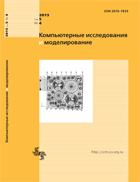All issues
- 2025 Vol. 17
- 2024 Vol. 16
- 2023 Vol. 15
- 2022 Vol. 14
- 2021 Vol. 13
- 2020 Vol. 12
- 2019 Vol. 11
- 2018 Vol. 10
- 2017 Vol. 9
- 2016 Vol. 8
- 2015 Vol. 7
- 2014 Vol. 6
- 2013 Vol. 5
- 2012 Vol. 4
- 2011 Vol. 3
- 2010 Vol. 2
- 2009 Vol. 1
Phase transition from α-helices to β-sheets in supercoils of fibrillar proteins
The transition from α-helices to β-strands under external mechanical force in fibrin molecule containing coiled-coils is studied and free energy landscape is resolved. The detailed theoretical modeling of each stage of coiled-coils fragment pulling process was performed. The plots of force (F) as a function of molecule expansion (X) for two symmetrical fibrin coiled-coils (each ∼17 nm in length) show three distinct modes of mechanical behaviour: (1) linear (elastic) mode when coiled-coils behave like entropic springs (F<100−125 pN and X<7−8 nm), (2) viscous (plastic) mode when molecule resistance force does not increase with increase in elongation length (F≈150 pN and X≈10−35 nm) and (3) nonlinear mode (F>175−200 pN and X>40−50 nm). In linear mode the coiled-coils unwind at 2π radian angle, but no structural transition occurs. Viscous mode is characterized by the phase transition from the triple α-spirals to three-stranded parallel β-sheet. The critical tension of α-helices is 0.25 nm per turn, and the characteristic energy change is equal to 4.9 kcal/mol. Changes in internal energy Δu, entropy Δs and force capacity cf per one helical turn for phase transition were also computed. The observed dynamic behavior of α-helices and phase transition from α-helices to β-sheets under tension might represent a universal mechanism of regulation of fibrillar protein structures subject to mechanical stresses due to biological forces.
Copyright © 2013 Zhmurov A.A., Alekseenko A.E., Barsegov V.A., Kononova O.G., Kholodov Y.A.
Views (last year): 6. Citations: 1 (RSCI).Indexed in Scopus
Full-text version of the journal is also available on the web site of the scientific electronic library eLIBRARY.RU
The journal is included in the Russian Science Citation Index
The journal is included in the RSCI
International Interdisciplinary Conference "Mathematics. Computing. Education"







